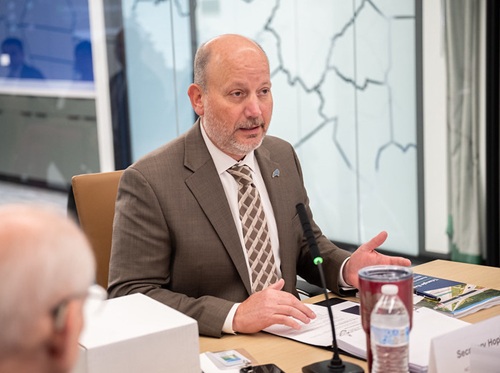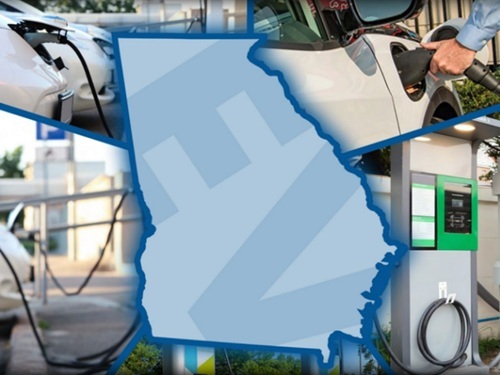A program started by the North Carolina Department of Transportation in 2024 is helping formerly incarcerated individuals secure jobs on transportation work crews and get identification cards to access housing and healthcare more easily.
[Above photo by NCDOT]
The agency’s Transitional Work Pilot program – created in January 2024 as a result of Executive Order 303 issued by former Governor Roy Cooper (D) and continued under Governor Josh Stein (D) – aims to make reentry to the workforce easier for people who are released from North Carolina prisons each year.
Other state agencies are improving their workforce development programs as part of the same executive order, including: the North Carolina Department of Natural and Cultural Resources, the North Carolina Department of Environmental Quality, and the North Carolina Department of Public Safety.

“Removing barriers, creating job opportunities, and improving reentry services so participants can be successful and productive after they leave prison helps reduce crime and breaks the cycle of relapse,” said state NCDOT Secretary Joey Hopkins in a statement.
NCDOT’s Ebony Pittman, deputy secretary for business administration, said the agency’s main goal with its transitional work program is trying to help formerly incarcerated people overcome common obstacles to employment.
“Individuals with prior incarceration face significantly lower callback rates from potential employers compared to those without criminal records,” Pittman said. “This program provides a meaningful pathway to both short-term and long-term employment for people who may be losing hope due to their past. Ultimately, formerly incarcerated people deserve a second chance.”
Several NCDOT programs are working with the North Carolina Department of Adult Correction to improve reentry services, including:
- NCDOT’s On the Job Training program recently completed its first transportation work training academy for five formerly incarcerated people. Participants were trained in Raleigh in areas such as operating heavy equipment, directing traffic in work zones or surveying property. The work is part of NCDOT’s Highway Construction Trade Academies. During the academy, staff with NCDOT’s On the Job Training program worked with Correction Enterprises, the prison industry division of the North Carolina Department of Adult Correction, to identify interested people recently released from prison or preparing to leave prison. Once enrolled in the academy, NCDOT employees, contractors and others spent two weeks training participants in highway construction related work.
- The NCDOT’s Division of Motor Vehicles stepping up its efforts to issue state ID cards to those who are eligible ahead of their release from prison. The identification cards are necessary for people to access healthcare, employment, housing and other services. On average, about 137 ID credentials are issued a month to incarcerated people or people soon leaving incarceration.
- NCDOT staff in the Charlotte area awarded a $274,000 contract in July to the Center for Employment Opportunities to help put formerly incarcerated people to work doing daily maintenance activities along Charlotte roads since last fall. Participants have cleaned up roadside litter, worked on traffic control or roadside mowing and maintenance services. The contract requires the center to screen participants for their eligibility and fitness to work. The center is also required to provide participants with proper protective equipment such as steel-toed boots, and free transportation to and from work sites. Staff with the center supervise participants at work sites. The arrangement has been successful because it has enabled NCDOT to put folks to work on much-needed daily maintenance tasks and assess future candidates for employment, said Felix Obregon, NCDOT’s maintenance engineer for the Charlotte-area highway division.
Other state departments of transportation are engaged in similar efforts.
For example, a now five-year-old program started by the Iowa Department of Transportation helps incarcerated individuals regain their driving privileges before leaving the state’s prison system – an effort started to reduce the chances of recidivism, the agency said.
Started as a pilot program in 2020 in partnership with the Iowa Department of Corrections, the Iowa DOT’s Mobility Manager program within the agency’s Motor Vehicle Division’s Customer Services Bureau provides several driving services through five onsite offices and two remote arrangements.
Meanwhile a recent video detailed how the Kentucky Transportation Cabinet has helped former prison inmates get hands-on crew experience in landscaping, graffiti removal, rest area cleaning, and litter pickups as part of a job skills program aimed at putting them on the path to gainful employment.
Since 2019, the agency has partnered with the Center for Employment Opportunities in its District 5 and District 6 regions to provide employment services exclusively to individuals who have recently returned home from incarceration.
 States
States
Podcast: Flashing LED Lights Can Boost Roadway Safety
December 5, 2025 States
States

